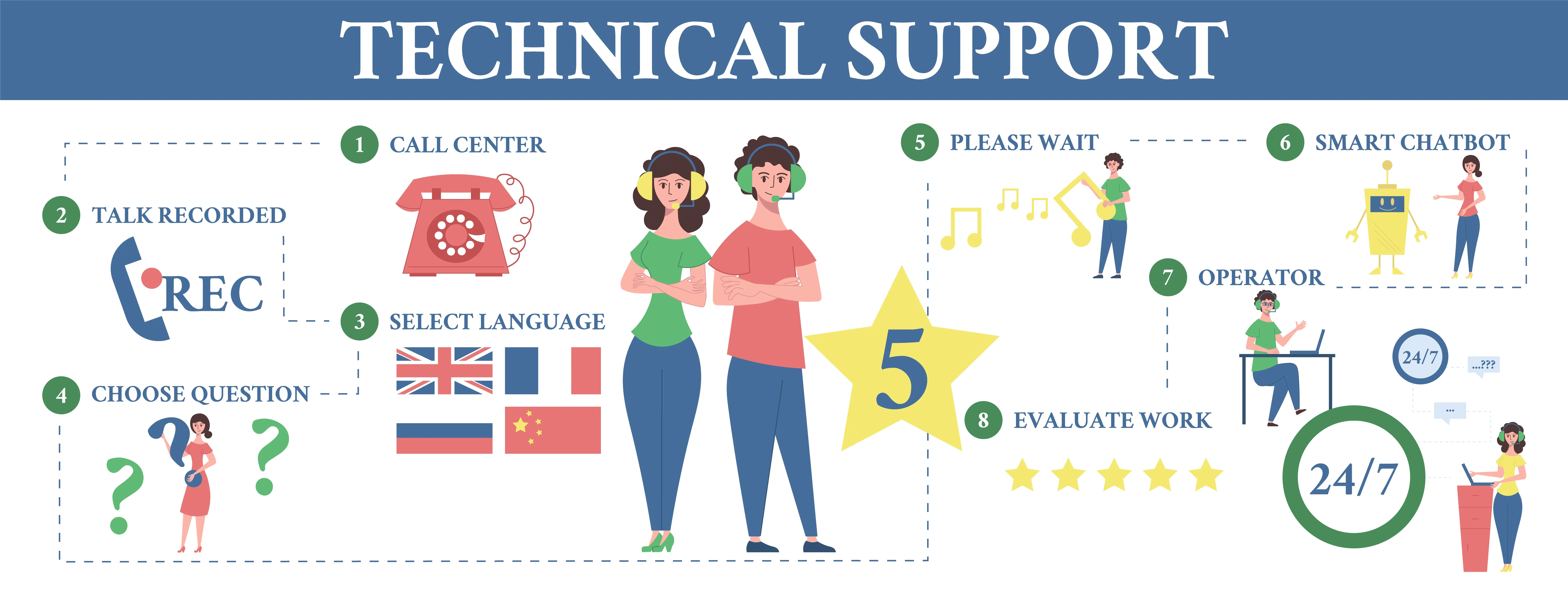Interview Questions
IT Support Engineer

Table Content
Overview of the IT Support Engineer Role
An IT Support Engineer ensures seamless technology operations within an organization by managing hardware, software, networks, and user-related issues. This role is crucial in minimizing downtime and maintaining high system performance.
Key Responsibilities
- User Support: Troubleshoot hardware/software issues for end-users
- Network Monitoring: Ensure uptime and troubleshoot connectivity
- Hardware Maintenance: Install and configure desktops, printers, and mobile devices
- Ticketing Systems: Log and resolve issues using platforms like JIRA or ServiceNow
- IT Policies: Enforce security and backup protocols
- Remote Support: Assist users via tools like TeamViewer or AnyDesk
Top IT Support Engineer Interview Questions & Answers
1. What is the difference between a hub, switch, and router?
Answer:
- Hub: Broadcasts data to all devices (no intelligence).
- Switch: Sends data to a specific MAC address on a LAN.
- Router: Connects different networks and routes traffic between them.
2. How do you troubleshoot a computer that won't start?
Answer:
Check power cable > Check display > Listen for POST beeps > Boot into BIOS > Try Safe Mode > Check hardware components like RAM and HDD.
3. What is DNS and why is it important?
Answer:
DNS (Domain Name System) resolves domain names (like google.com) into IP addresses. It's essential for accessing websites and services by name.
4. What is an IP address?
Answer:
An IP (Internet Protocol) address is a unique identifier assigned to a device on a network. Types: IPv4 (e.g., 192.168.1.1) and IPv6.
5. How would you fix a slow computer?
Answer:
- Check background apps
- Free up disk space
- Scan for malware
- Increase RAM or upgrade HDD to SSD
- Disable startup programs
6. What is the difference between RAM and ROM?
Answer:
- RAM: Temporary memory used for running applications
- ROM: Permanent memory that stores boot firmware (BIOS)
7. How do you handle a user who can't connect to Wi-Fi?
Answer:
- Check SSID and password
- Verify Airplane Mode is off
- Restart the device/router
- Check IP settings
- Flush DNS or reset TCP/IP stack
8. What’s the role of Active Directory?
Answer:
Active Directory manages user accounts, devices, and access permissions in a Windows domain environment.
9. How do you reset a user password remotely?
Answer:
Via Active Directory: Open dsa.msc > Find user > Right-click > Reset Password. For Office 365, use the admin center.
10. What is the difference between NTFS and FAT32?
Answer:
NTFS supports larger files, security permissions, and encryption. FAT32 is older, has a 4GB file size limit, and lacks security features.
11. What is BSOD and how do you resolve it?
Answer:
BSOD (Blue Screen of Death) indicates a system crash. Use error code to identify cause, update drivers, run hardware diagnostics, and check for malware.
12. How do you deploy software to multiple users?
Answer:
Use Group Policy (GPO), Microsoft SCCM, PDQ Deploy, or login scripts to push software to domain-connected devices.
13. What tools do you use for remote support?
Answer:
TeamViewer, AnyDesk, Remote Desktop (RDP), LogMeIn, Chrome Remote Desktop.
14. How do you stay updated on IT trends?
Answer:
Subscribe to sites like TechCrunch, Reddit r/sysadmin, Spiceworks, follow YouTube channels (NetworkChuck, CBT Nuggets), and attend webinars or certification programs.
15. Explain the OSI Model.
Answer:
A 7-layer model that standardizes network communication:
- Physical
- Data Link
- Network
- Transport
- Session
- Presentation
- Application
16. What is safe mode?
Answer:
Safe Mode boots Windows with minimal drivers, useful for diagnosing issues like driver conflicts or malware.
17. What are Group Policies?
Answer:
Rules applied via Active Directory to enforce settings like password policies, software installation, and network access across users/devices.
18. How would you handle a printer issue?
Answer:
- Check connectivity
- Restart printer spooler
- Update drivers
- Reinstall printer
- Test using another device
19. What’s your process when receiving a new ticket?
Answer:
Acknowledge > Triage based on priority > Troubleshoot > Resolve or escalate > Document solution > Close ticket.
20. How do you ensure data security on endpoints?
Answer:
- Enforce antivirus and firewalls
- Apply OS patches
- Use BitLocker encryption
- Limit admin access
- Train users on phishing threats
Frequently Asked Questions
Is certification important for IT Support Engineers?
What soft skills are essential for this role?
Can this role transition into network administration?
What’s the average salary for an IT Support Engineer?
Is scripting knowledge necessary?
What industries hire IT Support Engineers?
What’s the difference between L1, L2, and L3 support?
Do IT Support roles require night shifts?
Which ticketing tools are popular?
What’s the career path from this role?
Conclusion
IT Support Engineers are the unsung heroes of smooth business operations. This role requires not just technical know-how, but also empathy, communication, and adaptability. Whether you’re interviewing for your first IT job or moving to a senior role, mastering these questions and scenarios will boost your confidence and increase your chances of landing the job.
Related Interiew Questions
We are here to help you find a solution that suits your business need.